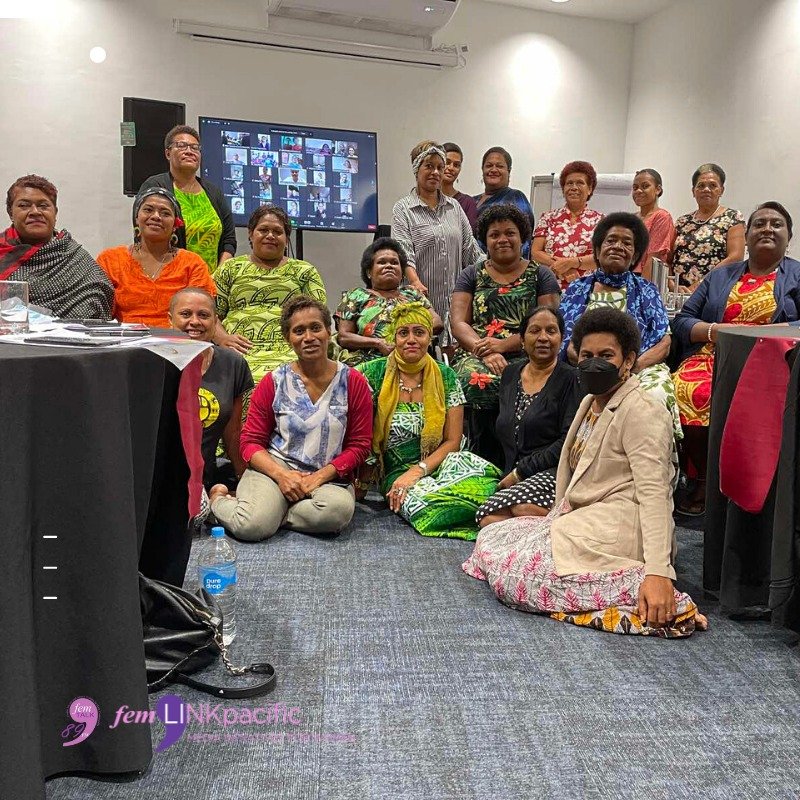by Maxine Tuwila Lesivou
Diverse women of our Central Division congregated face to face, and joined by over fifty women across the Northern and Western Divisions via Zoom.
OVER fifty (50) diverse women leaders that are members of femLINKpacific’s Rural Women Leaders Community Media Network (RWLCMN) took part in the first Hybrid method National Convening for the year; taking two days - Monday (31st January) and ended on Tuesday, 1st February.
“ENDING VIOLENCE AGAINST WOMEN AND GIRLS IN A CRISIS CONTEXT. Rural women leaders building community safety net within humanitarian crisis” was the theme for this Convening to end the month of January and to start off the month of February.
Women leaders from various organisations, clubs and networks presented their views on the first, second and third wave of COVID-19 and the need for more information with response to Violence Against Women & Girls (VAWG) during this pandemic.
Speaking to women leaders on Monday, Fiji Women’s Crisis Centre Shelter Manager/ National Helpline Coordinator, Ilisapeci Veibuli said that this meeting with Women Leaders is important and she acknowledges the critical effort and support that women leaders have been providing amongst its members during this time in responding to VAWG even with the increasing number of Domestic Violence cases.
Ilisapeci Veibuli, FWCC Shelter Manager
“During this pandemic, it (Domestic Violence Helpline) really does ensure that our women, survivor of violence and children’s voices are heard… the Helpline recorded an increase in Domestic Violence during the pandemic, however, there were also an increase in women leaders accessing it in reporting these DV cases. I would also like to acknowledge the critical support that you all have in ending VAWG and it’s important that we educate our communities in changing their mindsets towards VAWG.”
Impacts of the COVID-19 on all national and regional commitments surrounding gender equality in general is also a key challenge for the participants whilst trying to amplify their voices as women leaders during this pandemic.
While responding to queries from our women leaders, Veibuli said there’s a need for more community collaboration in VAWG response especially during this pandemic.
Koronubu Women’s Fellowship leader and Ba District Council of Social Services (DCOSS) President, Vani Tuvuki said the center should consider having women leaders as community advocates in EVAWG. She added that women that go through violence needs to be accommodated in safe houses to protect them from perpetrators.
“Women that go through violence needs to be placed in safe homes so they don’t have to be further stigmatized from our communities. We need to identify community advocates in communities that will be able to assist these women in times of crisis especially now during the pandemic and there’s an increasing number of cases.”
Tuvuki added that we need to change our mindsets towards VAWG and we need to stop the victim blaming that we are known for.
Bonita Qio the coordinator for Pacific Rainbows Advocacy Network (PRAN) shared the same sentiment saying that majority of perpetrators are in our homes.
“From my own personal observation, I see that it is us in our own families/ households are perpetrators and we condone this type of behaviors – VAWG. We need to stop being a hypocrite and start reporting these violence in our homes so we lessen the number of cases of domestic violence – we need to change our mindsets for the betterment of our future generations.”
Communities represented in this National Consultation includes District Advisory Councillors (DAC), members of the LGBTIQ + community, Marama-ni-koro’s, Women living with disability, Young Women, members of the District Council of Social Services (DCOSS) and Community Health Care Workers.



